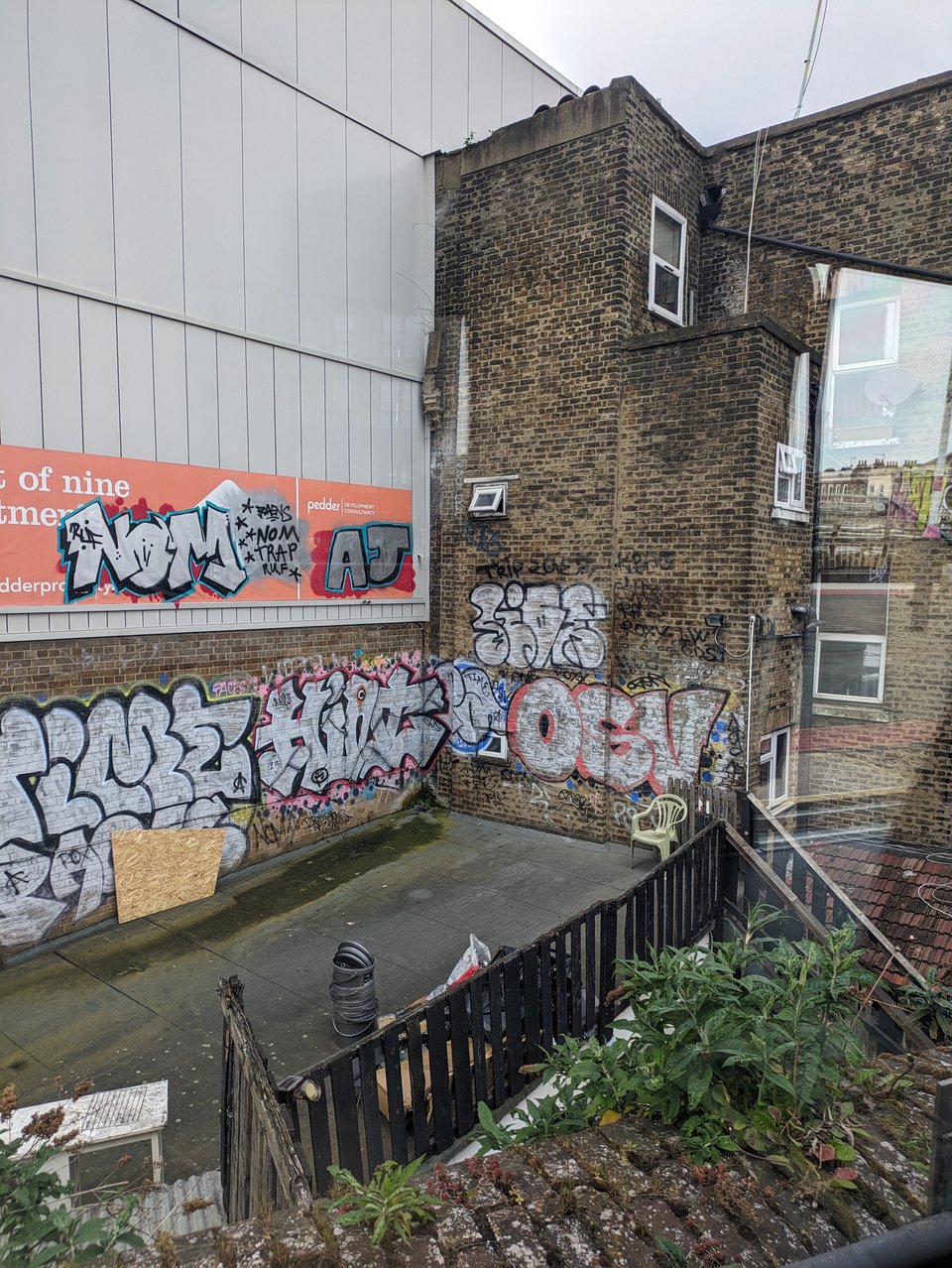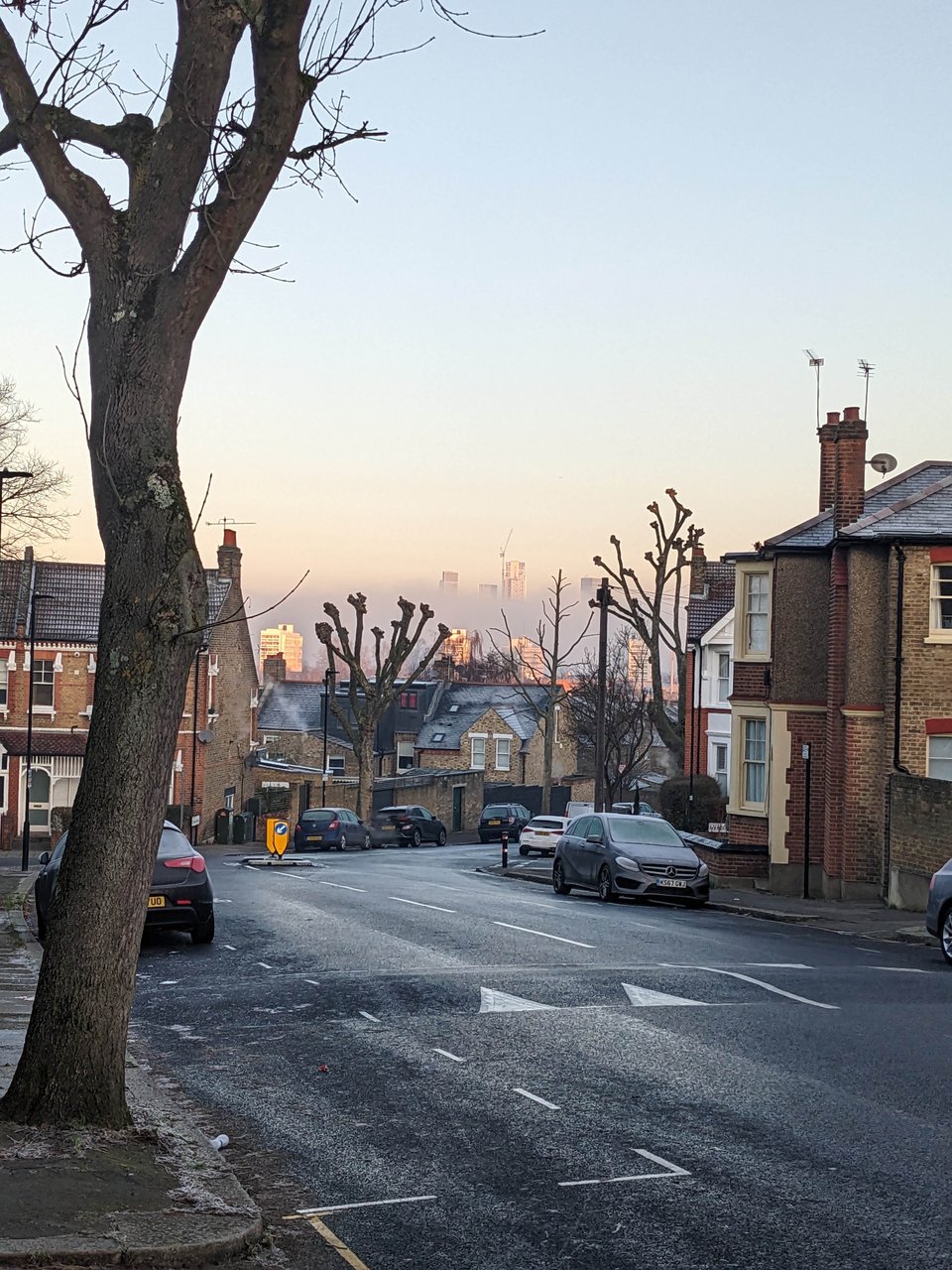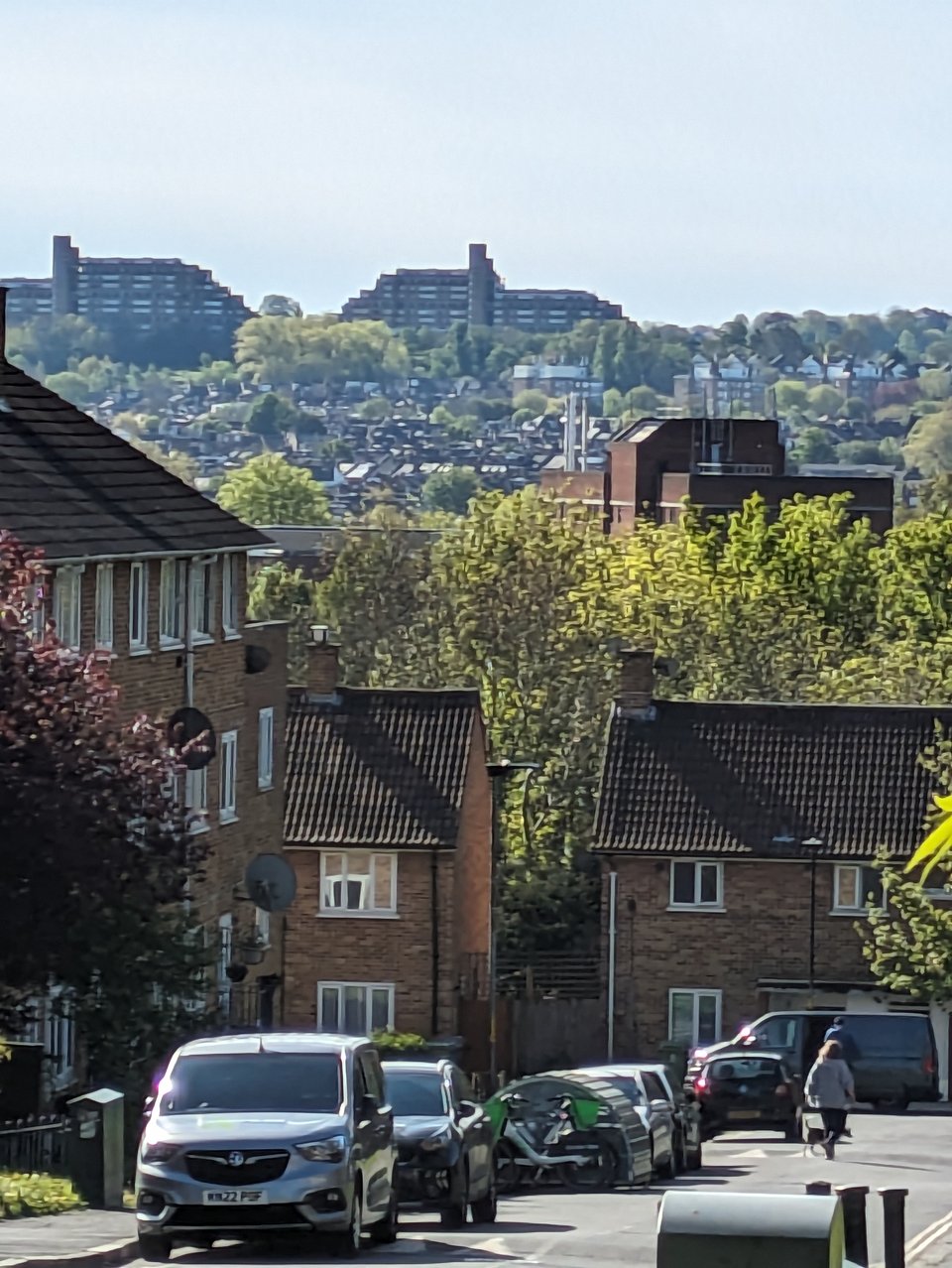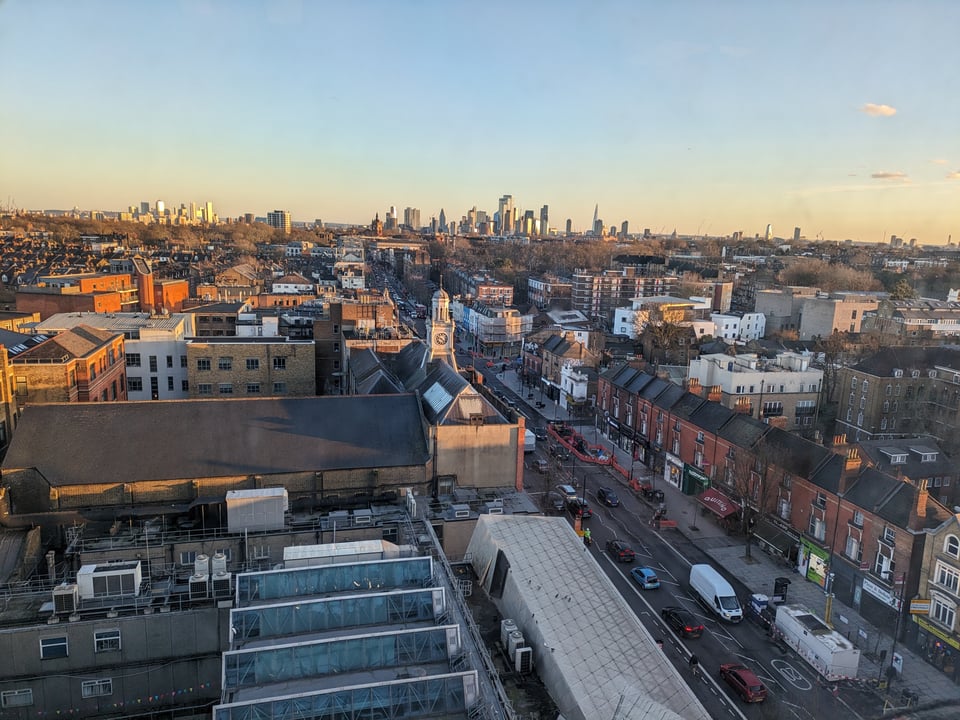Why I'm not done with London (though London might be done with me)
2024-05-05

When thinking about London I often remember Peter Ackroyd doing the rounds at the turn of the century to promote his book, "London:The Biography". When speaking of the visual character of the city, he often referred to it as ugly. This wasn't necessarily a bad thing, in many ways this ugliness made up a good part of what he loved about it:
London has always been an ugly city. It is part of its identity. It has always been rebuilt, and demolished, and vandalised. That too, is part of it's history. The ancient creed – cursed be he that removeth old landmarks – has never been observed in the city. In fact one of the characteristics of London planners and builders, over the centuries, has been the recklessness with which they have destroyed the city's past.
Peter Akroyd, London: The Biography, 2001
I think about this quote and others that bring attention to the architectural hotchpotch that makes up the city. The London skyline, or any other vista within the city, cannot be taken in within a single glance. There is no uniformity to give rise to a singular character. Some detail or style will always leap out, causing the contrary styles that surround it to fade into the background. I think this accords with the multiplicities that London represents. As Aditya Chakrabortty recently observed in his excellent Guardian column, the Right can't decide whether it hates London for being a no-go area of knife crime and sharia or a Prosecco and pronouns, Islingtonian cultural elite.

Similarly, London presents itself in different ways to different viewers. While catching the Thameslink into the city with my eldest child a few years back, we noticed a very posh family a few seats down. The father observed the new towers that had been built at Elephant and Castle and informed his children in clipped tones about how the area was “nicer” now. He no doubt remembered the blocks of the Heygate Estate that preceded the nice towers as violent and unwelcoming. Needless to say, I (loudly) informed my own child about the forced evictions that preceded the Heygate's demolition. The flat owners who took up the Thatcherite dream of option-to-own refused the lowball offers from developers and found themselves walking back to their flats in complete darkness in a mostly abandoned estate. For me, the new towers were far from "nice". While the Heygate undoubtedly suffered the ills of many inner city estates, the means of its replacement was also an act of violence. It didn't remedy the poverty, it outsourced it.
Peter Ackroyd also grew up on a housing estate and, at the time in which he completed his biography of London in 1999, people and capital were flowing back into the city. The first stirrings of the next phase of demolition and vandalism could be seen within the plated glass towers that were popping up within the Square Mile. The Olympic development was just a twinkle in Seb Coe's eye and the regenerations of Elephant, South Kilburn and South Acton were still many years away. At the same time, I also drifted into the city, one of countless sons and daughters whose parents had moved to the outskirts in the 70s and 80s.
The 90s and early 00s felt like the right time for artists, writers and musicians to set up shop. These weren't necessarily the exclusive hipster enclaves that popped up from the mid-00s onwards, in the sense that those washing ashore in Islington, Camden and Brixton were attracted by the cultural histories of the areas and wanted to be a part of it. The later enclaves were very much about finding cheap rent for housing and studios in deprived areas (Hackney, Dalston, Peckham) out of economic necessity. I remember an article about artists being priced out of areas by the economic forces that they helped set in motion, one of whom spoke of having to find a "new frontier" without realising how much of a giveaway that particular choice of words was. Meanwhile the people who grew up in Peckham have since decamped to Catford due to the gentrification that the enclaves set in motion but the broadsheets weren't as interested in their take.
A quarter of a century later, it sometimes feels like the end of an era, one where I find myself wistful for the hipsters, as much as they got on my tits at the time. It feels like mission accomplished for those forces who wanted to drain the capital of all of its cultural messiness for the vision of an unregulated fiscal centre . The vilification of the city that Chakrabortty spoke of has also fuelled the more spiteful side of the levelling-up agenda of the Tory administration, threatening many organisations' funding unless they hastily relocate to another region. I am all for other regions enjoying the access to the arts that Londoners have had access to (and let's not forget that the levelling up process requires them to compete against each other for funding), but I don't see it as cause to deprive nine-million people of art and culture, especially those who live in parts of London with poverty rates that are among the highest in the UK.

Most of the artists and writers I know from back in the day have once again moved out to the suburbs and towns of the outskirts, or to other British cities. They were the smart ones. I, on the other hand, remain – more for the schools that my kids go to and my spouse who was born and raised in the city and has no desire to live anywhere else.
At the same time, guess what the kids of those aforementioned suburbanites are planning to do as soon as they're old enough? That's right, move right back into London. I remember Simon Munnery performing a poem about the same thing twenty or so years ago. We've been here a few times before.
That said, there is one more factor that has sprung up in those twenty or so years. I, and all those other kids from orbital towns, would often head into London for the record shops and bookstores, knowing that our local WHSmiths and Our Price wouldn't be stocking the desired cultural objects. Those little journeys into the city served as reconnaissance surveys that sowed the seeds of the dream of having all of those things at our doorsteps, or a bus ride away at least.
But nowadays the cultural objects are not so much objects as they are strings of code, ethereal streams of information that arrive via subscriptions, social sites or the internet's more nautical regions. It's all instantly available at the swipe of a glass rectangle.

And yet, I think back at one of my own formative moments as a young art student, where I found myself stood in front of a Picasso, and how the mere proximity of this object led to something that had been closed within my own mindset being blasted open. It's the same for so many other people I know. For some it was the moment when they saw a certain band perform live in a grimy little venue, not an arena show where all seats are allotted and the pores of the singer's face can be seen in glorious detail on a big screen – but rather those moments where a sound that they never knew existed before blasts back at them from sweaty basement walls. As I have banged on about to the point of every reader's tedium, walking into a basement in Covent Garden one spring evening in 1997 changed and forever defined my life in all the years since.
Cometh the day – when every pint crosses the ten-pound meridian and every basement in zones 1-2 becomes overflow for overbooked upstairs diners – there's something about the city itself, with its paradoxes, parallaxes, contradictions and multiplicities, that hones and influences the ideas and aesthetics that bedrock the creations of London's artists. As Ackroyd also said in an interview with the Times in 2000:
“Leytonstone, Forest Gate, anywhere to explore the terrain - walking was as much part of the research as reading books, to get a sense of atmosphere, a sense of place, and people, remnants of past times.”
London is a uniquely brutalising and ugly city; Interview Peter Ackroyd- Tim Teeman, 23/9/2000
In this sense, I look back at how my own poetry didn't reach its artistic maturity until I moved to London. How the flat suburban spread of Slough lent a flatness to the profundities I spouted. London lent that necessary, chaotic geometry that led to a distrust for profundity that has carried me ever since.
Even if I never regale audiences with my verse at a London venue again, the flow and flux of this city will never fail to spark little monstrosities that I'll keep sharing whichever way I can. I may sometimes feel that London as an artistic centre might be done for or, at the very least, done with me. But as an artist, I'm not yet done with London. Even at its most exclusionary, this city still has so much to give.
Thanks for reading this
As you might have guessed, London has been on my thoughts this week, mainly due to all the hoo-ha surrounding the London Mayoral elections. A booklet was mailed to Londoners a few days before the polls opened and the contents of said booklet were particularly hair raising. Whatever you can say about London, it isn't a right wing city. While many (but not all) of the outer boroughs are more conservative it's worth noting that the only Tory London mayor to date made himself appear to be more of a centrist figure, with a passion for green polices, at the time. When Zac Goldsmith (who was very much the centrist/green Tory that Boris cosplayed as during his mayoralty) was soundly beaten by Sadiq Khan for his first term, many thought it was because of the negative Islamophobic dog whistles that bedevilled his campaign. And yet, when I read through the booklet, it was a role call of far-right buzz terms that would lead to most of them losing their deposits let alone getting within sniffing distance of the mayoralty. Even the Tory candidate seemed to think that the single issue that recently won the Uxbridge bi-election (the expansion of the Ultra Low Emissions Zone) would apply to the city as a whole.
So why would so many right wing ideologues seek to partake in such a zero-sum game? I think it's because there's a very loud coterie of anti-Khan blowhards on a website that's owned by another right winger who once cosplayed as a green centrist. To the outsider, it might seem like their votes are for the taking. The only problem with this is that most of these blowhards don't live on London but, by the heavens, they love to moan about it. These blowhards seem to be mainly concerned with statues, high emission vehicles, unauthorised channel crossings (I'm guessing the London Mayor deals with the small boats that loop around Kent to row against the current to the area west of Gravesend) and what they see as the "Islamification" of a city they choose not to live in.
And so, after reading the handout aloud to my family in a number of silly voices (apart from Count Binface who was given the gravitas that he deserved) I got to thinking about the population of London and how, despite how awful we can be, we tend not to fall for that load of old pony. It could be because those off us that live closer to the bread line also live cheek by jowl with the rich – and it's harder to spin that old canard about asylum seekers being to blame for our precarity when we see where the money really goes.
I have despaired of the city recently, but mainly at what appears to the zenith of the current phase of gentrification. While I appreciate what Khan has done by funding free school meals when they were scrapped by the government at the national level and how he's also kept from hiking travel fares. But at the same time we're yet to see any meaningful action on the housing crisis, nor the private rent controls that he promised last time round.
And yet, there's something about this city that I just can't turn my back on, which got me thinking as I traipsed about. Those thoughts ended up being the content of this very post and the video I'll be posting on Tuesday. As said above, there's something about this city that shapes the skewwhiff geometry of my thinking and the writing that comes from those thoughts. The great poet Roy FIsher once declared that he thinks in Birmingham. I am proud to be one among many artists who think in London.
A message for my paid subscribers
I am aware that I owe you a poem! It will be working its way to your inbox tomorrow. I had to iron out a few technical details as this is the kind of thing I want to get right. The next poem will arrive on Thursday and will continue to arrive every Thursday after that. You have my gratitude for your patience and support.
If you don't receive a poem tomorrow it might be because you upgraded while I was offering a chose-your-own price sub a while back. I found out last week that these subs only lasted for a month and weren't recurring. I have since added two recurring options (£5/month or £50/year) if you would like to re-sub for a recurring plan.
If you are already a free subscriber but would like a free one-week trial, just reply to this email and say something nice. It doesn't have to be something nice about me. You could say something like "bears are cool, give me free week lol" and I'll be obliged to honour it.
Cheers,
Niall
Don't miss what's next. Subscribe to Rusty Niall:
Add a comment: